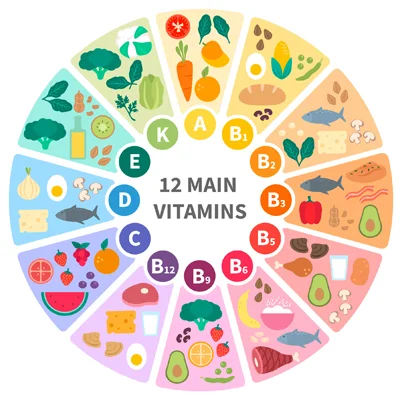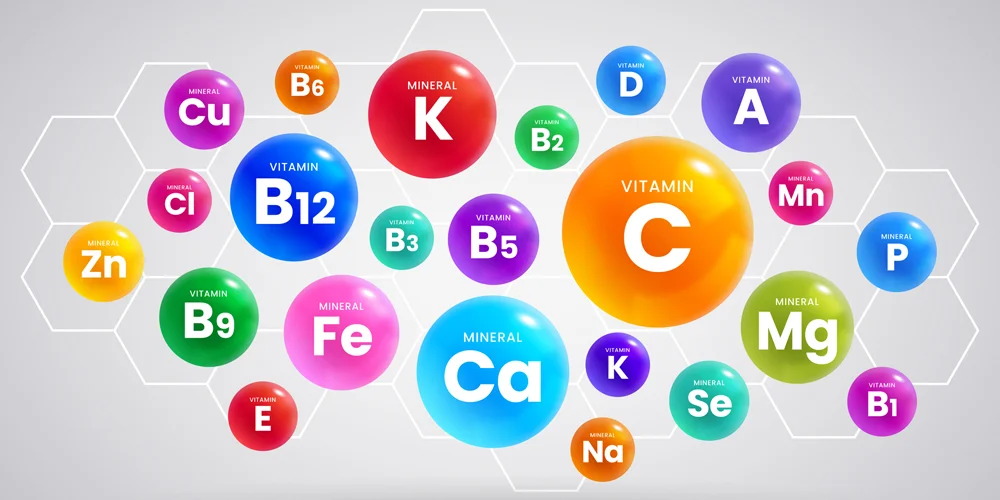Micronutrients are essential nutrients required by organisms in small quantities to maintain proper physiological functions, growth, and development. These include vitamins and minerals such as iron, zinc, copper, manganese, iodine, vitamins A, B, C, D, E, and K, among others. While they’re needed in smaller amounts compared to macronutrients like carbohydrates, proteins, and fats, micronutrients play crucial roles in various bodily functions, including enzyme activity, immune function, bone health, and overall well-being.
Types of Micronutrients
Micronutrients encompass various types of essential vitamins and minerals necessary for the body’s proper functioning. They’re generally categorized into two main groups: vitamins and minerals.
Vitamins: These are organic compounds required in small amounts for various physiological functions. They are broadly classified into two categories:
- Fat-soluble vitamins: Vitamins A, D, E, and K dissolve in fat and are stored in the body’s fatty tissues. They are absorbed along with fats in the diet and can be stored for longer periods.
Water-soluble vitamins: Vitamins B complex (such as B1, B2, B3, B5, B6, B7, B9, B12) and vitamin C are water-soluble and are not stored in the body for an extended period. They dissolve in water and are generally excreted in urine, so they need to be replenished regularly.
Minerals: These are inorganic elements that are essential for various bodily functions and are divided into two categories:
- Macro-minerals: These are required in larger quantities and include calcium, phosphorus, magnesium, sodium, potassium, chloride, and sulfur.
Trace minerals: These are needed in smaller amounts and include iron, zinc, copper, iodine, selenium, manganese, fluoride, chromium, and molybdenum.
Each micronutrient plays a specific role in supporting bodily functions, from supporting metabolism to maintaining bone health, aiding in energy production, and participating in enzyme activities and immune function. A balanced diet that includes a variety of fruits, vegetables, whole grains, lean proteins, and healthy fats ensures an adequate intake of these essential micronutrients.

Benefits of Micronutrients
Micronutrients, despite being required in smaller amounts compared to macronutrients, are incredibly vital for overall health. Their benefits span across various bodily functions and contribute significantly to well-being. Here are some key advantages of micronutrients:
- Supporting Metabolism: Micronutrients such as B vitamins play a crucial role in converting food into energy. They are cofactors in metabolic reactions, aiding in the breakdown of carbohydrates, proteins, and fats.
- Promoting Growth and Development: Micronutrients are essential for normal growth, development, and maintenance of tissues. They are particularly crucial during periods of rapid growth, such as childhood, adolescence, and pregnancy.
- Enhancing Immune Function: Certain vitamins and minerals, like vitamins C, D, and zinc, support the immune system, helping the body to fight off infections and illnesses.
- Maintaining Bone Health: Micronutrients like calcium, vitamin D, magnesium, and phosphorus play vital roles in bone health and density. They contribute to bone formation, strength, and prevention of conditions like osteoporosis.
- Aiding in Nerve Function: Micronutrients such as B vitamins (especially B6, B12, and folate) are crucial for nerve function and the synthesis of neurotransmitters.
- Acting as Antioxidants: Some micronutrients, like vitamins A, C, and E, and minerals such as selenium and zinc, act as antioxidants. They help neutralize harmful free radicals in the body, reducing oxidative stress and cellular damage.
- Regulating Enzyme Activity: Micronutrients serve as cofactors or components of enzymes, facilitating various biochemical reactions in the body that are necessary for functions like digestion, energy production, and hormone synthesis.
- Supporting Vision and Skin Health: Vitamins A, C, and E, along with minerals like zinc, are essential for maintaining healthy vision, skin, and mucous membranes.
- Balancing Hormones: Certain micronutrients, like iodine, are necessary for the production of thyroid hormones that regulate metabolism, growth, and energy expenditure.
- Preventing Deficiency-Related Diseases: A deficiency in specific micronutrients can lead to various health issues. Ensuring an adequate intake helps prevent conditions like anemia (iron deficiency), scurvy (vitamin C deficiency), and rickets (vitamin D deficiency).
A balanced and varied diet that includes a wide range of fruits, vegetables, whole grains, lean proteins, and healthy fats is crucial for obtaining an adequate amount of micronutrients. Dietary supplements might be necessary in cases of deficiencies, but it’s essential to consult a healthcare professional before starting any supplementation.
How are micronutrients made?
Micronutrients, being essential vitamins and minerals, are not synthesized by the human body. They are obtained through the diet from various food sources. However, the process of how micronutrients are produced for supplements or fortification purposes involves different methods:
- Synthetic Production: Many micronutrients are synthesized in laboratories. This involves chemical processes to create the specific vitamins or minerals in pure form. For instance, vitamin C (ascorbic acid) can be synthesized from various starting materials through chemical reactions.
- Extraction from Natural Sources: Some micronutrients are extracted from natural sources such as plants, animals, or minerals. For example, vitamin E can be extracted from vegetable oils, while minerals like iron or zinc might be derived from ores and refined for use in supplements.
- Fermentation: Certain vitamins, like vitamin B12, are produced through fermentation processes using bacteria or fungi. This involves cultivating specific microorganisms in controlled conditions to generate the desired vitamin.
- Fortification: In the case of fortification of food and beverages, manufacturers add specific vitamins and minerals to enhance the nutritional content of the products. This process involves adding these micronutrients to food items during production.
Once produced or extracted, these micronutrients are often processed into different forms, including powders, liquids, capsules, or tablets, and then packaged as supplements or used in fortification programs to enrich foods with essential vitamins and minerals.
While these methods ensure availability and accessibility of micronutrients, obtaining these nutrients through a balanced diet from natural food sources remains the most recommended way to ensure optimal absorption and utilization by the body.

How do micronutrients work?
Micronutrients, comprising vitamins and minerals, play vital roles in various physiological functions. They work in diverse ways within the body, often acting as cofactors, facilitators, or regulators in biochemical reactions. Here’s how they function:
- Enzyme Activity: Many micronutrients serve as cofactors for enzymes. Enzymes are proteins that catalyze biochemical reactions in the body, and micronutrients act as essential components or helpers for these enzymes to function properly. For example, minerals like zinc and magnesium are cofactors for numerous enzymes involved in metabolism.
- Cellular Processes: Micronutrients participate in cell signaling and communication. They regulate cellular processes such as growth, differentiation, and apoptosis (programmed cell death). For instance, vitamins A and D play roles in regulating gene expression and cell differentiation.
- Energy Production: B vitamins, including thiamine (B1), riboflavin (B2), niacin (B3), pantothenic acid (B5), and others, are essential for converting carbohydrates, fats, and proteins into energy through various metabolic pathways.
- Antioxidant Properties: Some micronutrients, such as vitamins C and E, and minerals like selenium and zinc, act as antioxidants. They neutralize free radicals, which are highly reactive molecules that can cause cellular damage and contribute to aging and disease.
- Immune Function: Micronutrients are crucial for maintaining a healthy immune system. For example, vitamin C supports immune cell function and helps in the production of certain antibodies, while vitamin D is involved in modulating the immune response.
- Bone Health and Structure: Minerals like calcium, phosphorus, magnesium, and vitamin D are essential for building and maintaining strong bones and teeth. They contribute to bone mineral density and support skeletal structure.
- Hormone Regulation: Certain micronutrients, such as iodine, are necessary for the production of hormones like thyroid hormones, which regulate metabolism. Other vitamins like vitamin K are involved in blood clotting.
- Neurotransmitter Synthesis: Micronutrients, especially certain B vitamins, are essential for the synthesis of neurotransmitters in the nervous system. For instance, vitamin B6 is involved in the production of neurotransmitters like serotonin and dopamine.
These functions highlight the critical roles micronutrients play in maintaining overall health and well-being. Their deficiency or imbalance can lead to various health issues, emphasizing the importance of obtaining these nutrients through a balanced diet or supplementation when necessary.
Foodborne Diseases: Types, Symptoms, Causes & Prevention
Irritable Bowel Syndrome: Types, Symptoms, Causes & Prevention
Breast Cancer: Types, Symptoms, Causes, & Prevention
Migraine: Types, Symptoms, Causes & Home Remedies
Understanding Syncope: Symptoms, Causes & Home Remedies
Freckle: Symptoms, Causes, Prevention & Need to Know





